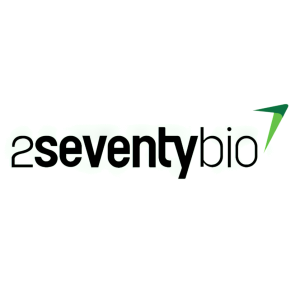2seventy bio Announces Plans to Initiate KarMMa-9 Study of Abecma (idecabtagene vicleucel) in Newly Diagnosed Multiple Myeloma Patients
This study will evaluate Abecma in patients with suboptimal response to transplant
Data from KarMMa-3 and KarMMa-2 studies of Abecma will be presented at future medical meeting
“Our focus at 2seventy is giving as much time as possible to patients who are battling cancer. We are moving rapidly to expand our clinical study program to determine utility of Abecma in newly diagnosed multiple myeloma patients with suboptimal response to transplant,” said
"Given the performance over other treatment options, autologous stem cell transplant will most likely continue to be the standard of care in patients newly diagnosed with multiple myeloma who are eligible,” said
Positive Results of Abecma in KarMMa-3 Topline and Real-World
The companies received topline results from KarMMa-3, a Phase 3, global, randomized, multicenter, open-label study evaluating Abecma compared to standard combination regimens in adults with multiple myeloma that are relapsed and refractory after two to four prior lines of therapy and refractory to the last regimen. KarMMa-3 is the first randomized clinical trial to evaluate a CAR T cell therapy in multiple myeloma. Results of a pre-specified interim analysis conducted through an independent review committee showed that KarMMa-3 met its primary endpoint of demonstrating a statistically significant improvement in progression-free survival. Treatment with Abecma also showed an improvement in the key secondary endpoint of overall response rate compared to standard regimens. Follow-up for overall survival, a key secondary endpoint, remains ongoing.
Safety results in the trial were consistent with the well-established and predictable safety profile of Abecma previously demonstrated in the pivotal KarMMa trial. No new safety signals were reported in this study.
The companies also disclosed that they will complete a full evaluation of the KarMMa-3 data and work with investigators to present detailed results at an upcoming medical meeting, as well as discuss these results with health authorities.
In addition, in
About Abecma
Abecma is the first-in-class B-cell maturation antigen (BCMA)-directed chimeric antigen receptor (CAR) T cell immunotherapy approved in the
Abecma was approved by the
The companies’ broad clinical development program for Abecma includes clinical studies (KarMMa-2, KarMMa-3, KarMMa-7, KarMMa-9) in earlier lines of treatment for patients with multiple myeloma. For more information visit clinicaltrials.gov.
Important Safety Information
BOXED WARNING: CYTOKINE RELEASE SYNDROME, NEUROLOGIC TOXICITIES, HLH/MAS, AND PROLONGED CYTOPENIA
- Cytokine Release Syndrome (CRS), including fatal or life-threatening reactions, occurred in patients following treatment with ABECMA. Do not administer ABECMA to patients with active infection or inflammatory disorders. Treat severe or life-threatening CRS with tocilizumab or tocilizumab and corticosteroids.
- Neurologic Toxicities, which may be severe or life-threatening, occurred following treatment with ABECMA, including concurrently with CRS, after CRS resolution, or in the absence of CRS. Monitor for neurologic events after treatment with ABECMA. Provide supportive care and/or corticosteroids as needed.
- Hemophagocytic Lymphohistiocytosis/Macrophage Activation Syndrome (HLH/MAS) including fatal and life-threatening reactions, occurred in patients following treatment with ABECMA. HLH/MAS can occur with CRS or neurologic toxicities.
- Prolonged Cytopenia with bleeding and infection, including fatal outcomes following stem cell transplantation for hematopoietic recovery, occurred following treatment with ABECMA.
- ABECMA is available only through a restricted program under a Risk Evaluation and Mitigation Strategy (REMS) called the ABECMA REMS.
Cytokine Release Syndrome (CRS): CRS, including fatal or life-threatening reactions, occurred following treatment with ABECMA. CRS occurred in
Identify CRS based on clinical presentation. Evaluate for and treat other causes of fever, hypoxia, and hypotension. CRS has been reported to be associated with findings of HLH/MAS, and the physiology of the syndromes may overlap. HLH/MAS is a potentially life-threatening condition. In patients with progressive symptoms of CRS or refractory CRS despite treatment, evaluate for evidence of HLH/MAS.
Fifty four percent (68/127) of patients received tocilizumab;
Overall rate of CRS was
Monitor patients at least daily for 7 days following ABECMA infusion at the REMS-certified healthcare facility for signs and symptoms of CRS. Monitor patients for signs or symptoms of CRS for at least 4 weeks after infusion. At the first sign of CRS, institute treatment with supportive care, tocilizumab and/or corticosteroids as indicated.
Counsel patients to seek immediate medical attention should signs or symptoms of CRS occur at any time.
Neurologic Toxicities: Neurologic toxicities, which may be severe or life-threatening, occurred following treatment with ABECMA, including concurrently with CRS, after CRS resolution, or in the absence of CRS. CAR T cell-associated neurotoxicity occurred in
Monitor patients at least daily for 7 days following ABECMA infusion at the REMS-certified healthcare facility for signs and symptoms of neurologic toxicities. Rule out other causes of neurologic symptoms. Monitor patients for signs or symptoms of neurologic toxicities for at least 4 weeks after infusion and treat promptly. Neurologic toxicity should be managed with supportive care and/or corticosteroids as needed.
Counsel patients to seek immediate medical attention should signs or symptoms of neurologic toxicity occur at any time.
Hemophagocytic Lymphohistiocytosis (HLH)/Macrophage Activation Syndrome (MAS): HLH/MAS occurred in
ABECMA REMS: Due to the risk of CRS and neurologic toxicities, ABECMA is available only through a restricted program under a Risk Evaluation and Mitigation Strategy (REMS) called the ABECMA REMS. Further information is available at www.AbecmaREMS.com or 1-888-423-5436.
Hypersensitivity Reactions: Allergic reactions may occur with the infusion of ABECMA. Serious hypersensitivity reactions, including anaphylaxis, may be due to dimethyl sulfoxide (DMSO) in ABECMA.
Infections: ABECMA should not be administered to patients with active infections or inflammatory disorders. Severe, life-threatening, or fatal infections occurred in patients after ABECMA infusion. Infections (all grades) occurred in
Febrile neutropenia was observed in
Viral Reactivation: Cytomegalovirus (CMV) infection resulting in pneumonia and death has occurred following ABECMA administration. Monitor and treat for CMV reactivation in accordance with clinical guidelines. Hepatitis B virus (HBV) reactivation, in some cases resulting in fulminant hepatitis, hepatic failure, and death, can occur in patients treated with drugs directed against plasma cells. Perform screening for CMV, HBV, hepatitis C virus (HCV), and human immunodeficiency virus (HIV) in accordance with clinical guidelines before collection of cells for manufacturing.
Prolonged Cytopenias: Patients may exhibit prolonged cytopenias following lymphodepleting chemotherapy and ABECMA infusion. In the KarMMa study,
Three patients underwent stem cell therapy for hematopoietic reconstitution due to prolonged cytopenia. Two of the three patients died from complications of prolonged cytopenia. Monitor blood counts prior to and after ABECMA infusion. Manage cytopenia with myeloid growth factor and blood product transfusion support according to institutional guidelines.
Hypogammaglobulinemia: Plasma cell aplasia and hypogammaglobulinemia can occur in patients receiving treatment with ABECMA. Hypogammaglobulinemia was reported as an adverse event in
Monitor immunoglobulin levels after treatment with ABECMA and administer IVIG for IgG <400 mg/dl. Manage per local institutional guidelines, including infection precautions and antibiotic or antiviral prophylaxis.
The safety of immunization with live viral vaccines during or following ABECMA treatment has not been studied. Vaccination with live virus vaccines is not recommended for at least 6 weeks prior to the start of lymphodepleting chemotherapy, during ABECMA treatment, and until immune recovery following treatment with ABECMA.
Secondary Malignancies: Patients treated with ABECMA may develop secondary malignancies. Monitor life-long for secondary malignancies. If a secondary malignancy occurs, contact Bristol Myers Squibb at 1-888-805-4555 to obtain instructions on patient samples to collect for testing of secondary malignancy of T cell origin.
Effects on Ability to Drive and
Adverse Reactions: The most common nonlaboratory adverse reactions (incidence greater than or equal to
Please see full Prescribing Information, including Boxed WARNINGS and Medication Guide.
About 2seventy bio
Our name, 2seventy bio, reflects why we do what we do - TIME. Cancer rips time away, and our goal is to work at the maximum speed of translating human thought into action – 270 miles per hour – to give the people we serve more time. We are building the leading immuno-oncology cell therapy company, focused on discovering and developing new therapies that truly disrupt the cancer treatment landscape With a deep understanding of the human body’s immune response to tumor cells and how to translate cell therapies into practice, we’re applying this knowledge to deliver next generation cellular therapies that focus on a broad range of hematologic malignancies, including the first FDA-approved CAR T cell therapy for multiple myeloma, as well as solid tumors. Our research and development is focused on delivering therapies that are designed with the goal to “think” smarter and faster than the disease. Importantly, we remain focused on accomplishing these goals by staying genuine and authentic to our “why” and keeping our people and culture top of mind every day.
For more information, visit www.2seventybio.com.
Follow 2seventy bio on social media: Twitter and LinkedIn.
2seventy bio is a trademark of
2seventy bio Cautionary Note Regarding Forward-Looking Statements
This press release contains “forward-looking statements” within the meaning of the Private Securities Litigation Reform Act of 1995 regarding, among other things, the research, development, and commercialization of Abecma. All statements that are not statements of historical facts are, or may be deemed to be, forward-looking statements. Such forward-looking statements are based on historical performance and current expectations and projections about our future financial results, goals, plans and objectives and involve inherent risks, assumptions and uncertainties, including internal or external factors that could delay, divert or change any of them in the next several years, that are difficult to predict, may be beyond our control and could cause our future financial results, goals, plans and objectives to differ materially from those expressed in, or implied by, the statements. These statements include, but are not limited to: statements about our plans, timelines and expectations with respect to the development of ide-cel, including the results and expected timing of ongoing and planned clinical trials; statements about the efficacy and perceived therapeutic benefits of ide-cel and the potential indications and market opportunities and demand therefor. These risks, assumptions, uncertainties, and other factors include, among others, the possibility that ide-cel not be successful in earlier lines of therapy, may not be commercially successful, that continued approval of such product candidate for such indication described in this release may be contingent upon verification and description of clinical benefit in confirmatory trials, and that the collaboration with Bristol Myers Squibb may not continue or be successful. No forward-looking statement can be guaranteed. Forward-looking statements in this press release should be evaluated together with the many risks and uncertainties that affect 2seventy bio’s business, particularly those identified in the risk factors discussion in 2seventy bio’s Annual Report on Form 10-K, as updated by our subsequent Quarterly Reports on Form 10-Q, Current Reports on Form 8-K and other filings with the
View source version on businesswire.com: https://www.businesswire.com/news/home/20220907005516/en/
Investors:
860-463-0469
Elizabeth.pingpank@2seventybio.com
Media:
774.313.9852
Morgan.adams@2seventybio.com
617-448-0281
jenn.snyder@2seventybio.com
Source:







